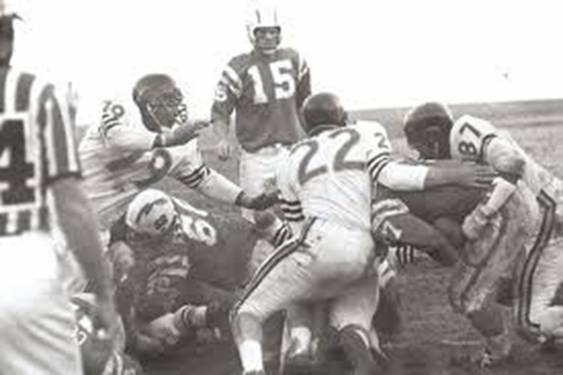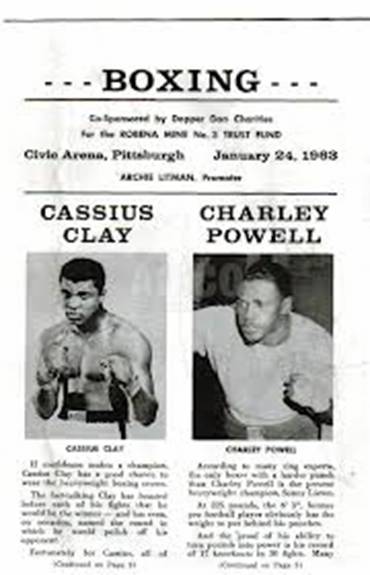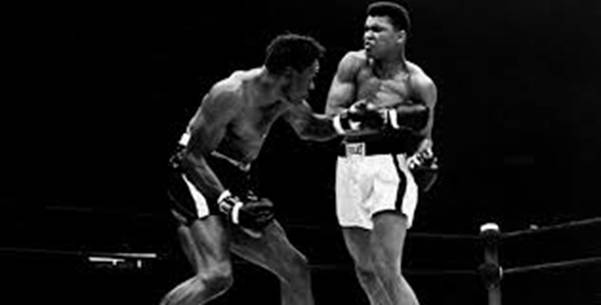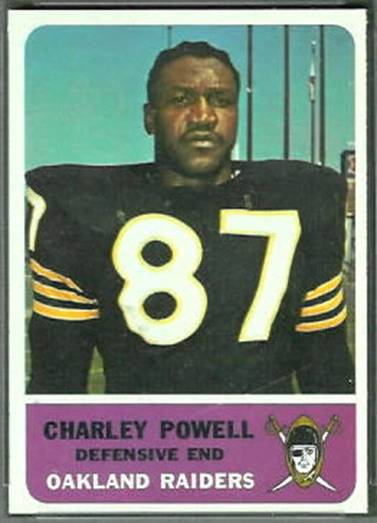

CHARLIE POWELL, A TRUE ATHLETE
HELMET HUT NEWS/REFLECTIONS October 2014:
CHARLIE POWELL, A TRUE ATHLETE
By Dr. Ken
My usual explanation for some of
my family’s socially
unacceptable behavior was
usually “Don’t look at me, I was
taken in by the dopey Polacks.”
While some of Polish ethnicity
may be offended by the use of
the term Polack, my father’s
family was fiercely proud of the
fact that they were “off the
boat immigrants” who worked
their way up from the bottom.
They wore what was an ethnic
slur to some, as a badge of
honor. The men on that side of
the family were a tough group;
hard working, hard drinking,
hard gambling, and hard fighting
iron workers with a few having
reputations as less than model
citizens. There were as the old
man said, “One or two clinkers
in the bunch” but almost all
were law abiding in an era and
in neighborhoods where hard
drinking, hard gambling, and
hard fighting were seen less as
vices, than standard ways to
blow off frustration with a life
that by any measure, could be
difficult. Adding to my father’s
frustration was what he saw as
an interruption in what could
have been a successful athletic
career. Dropping out of school
after fifth grade to support a
married teenaged brother and his
family, my father’s only outlet
from jobs as an ice man,
mechanic, and iron worker was
the Industrial League basketball
games played between the
employees of various New York
City based enterprises. A small
stipend and side bets fueled
these rather competitive
contests and I at times heard
his refrain that was very much
the equivalent of Marlon
Brando’s famous On The
Waterfront, “I coulda’ been a
contender instead of a bum,
which is what I am, let’s face
it.” My father held a deep
seated belief that under
different circumstances, he
could have “been an athlete” and
the quality of athleticism was
cherished. Other than showing
off his still deadly, even into
his mid-forties, underhand foul
shooting and antiquated two-hand
set shot as he competed well
with twenty year olds on a local
basketball court, he focused his
athletic interest on baseball,
which was typical for the era.
He still however, maintained
enough awareness about football
to at least know who the Polish
standouts were, with Giants
tackle Dick Modzelewski a
favorite.
In baseball, the Brooklyn
Dodgers ruled because we lived
in Brooklyn, and the loyalty was
maintained after we moved. When
the Dodgers migrated to Los
Angeles, my father bailed out on
them but we knew that Johnny
Podres was to be exalted, not
just for his heroics in the 1955
World Series but because he was
Polish. Despite hating the
Yankees, we were told to root
for Tony Kubek because “He’s one
of us” as was Bill Skowron. Even
the players in far off cities
like Bill Mazerowski and Moe
Drabowsky were revered. The
highest praise however, was
accorded to “the athletes,” men
like Gene Conley who played both
Major League Baseball and
professional basketball. That he
did both for championship teams
was, to my father, the ultimate
achievement. In Brooklyn, we of
course knew “everything” about
Jackie Robinson and he too was
my father’s hero. He overcame
great odds to get and make the
most of his opportunity to play
and as my father reminded me,
“This guy can be a pro at a lot
of sports.” Because he was one
of the great names and a star we
actually saw on the streets at
times, as we did most of the
Dodgers, I studied his history.
Robinson’s football
accomplishments made it obvious
he truly could have achieved
greatness in any number of
athletic endeavors.
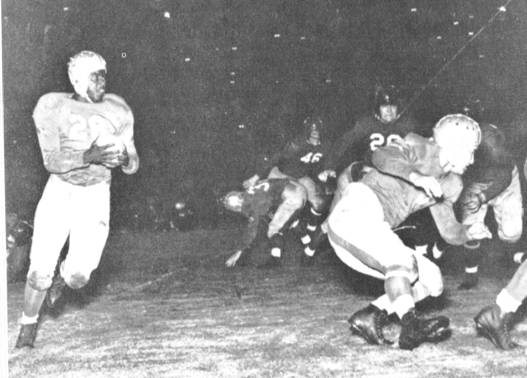 |
The Brooklyn Dodgers of baseball featured the great, ground breaking Jackie Robinson but only after he starred in football for UCLA
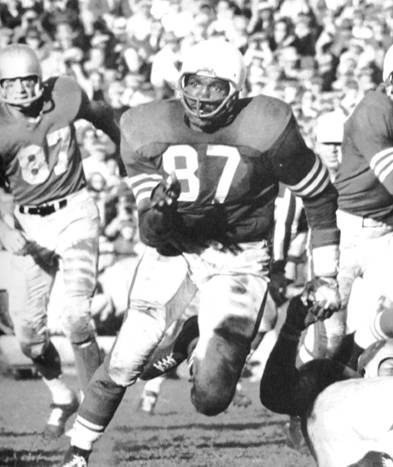 |
Powell graduated from San Diego High School as a multi-sport athlete who excelled in football, basketball, baseball, and track and field. Running hurdles and sprinting 100 yards in 9.6 seconds while also being the team’s shot putter certainly implied that he participated in both aspects of “track” and “field” and well reflected his athletic versatility. He had options, with offers from the Harlem Globetrotters, the St. Louis Browns baseball organization, and numerous college football scholarship offers. Notre Dame and the major powers of the western U.S. called for his services but he chose baseball. He left the St. Louis organization after a stint in the minor leagues, “bored” and missing football. He became the National Football League’s youngest player when he signed with the Forty Niners and immediately fought for a starting position as a 220 pound defensive end. From 1952 through ’57, Powell was relentless and though stout against the run, became what might have been the NFL’s first definitive pass-rush specialist. In a time that sacks were not recorded, he chased down and tackled Detroit Lions quarterback Bobby Layne behind the line of scrimmage ten times in one game.
In the off seasons, Powell continued to indulge in his love of boxing. As a youth, he took boxing lessons from one of his neighbors, World Champion Archie Moore. Fighting regularly at the local boys’ club, Powell’s father once remarked that “they had to stop him because he was knocking too many guys out.” He became a professional in 1953 and with success, sat out the 1954 football season to focus on his boxing career. He returned to the Forty Niners in ’55 but continued to box in a very serious manner in the off seasons. After the 1957 season, he again decided to place his efforts into boxing and retired from professional football. Reducing his playing weight from 230 to a “fighting trim” of 210, he began to climb the heavyweight ranks. By 1959, having knocked out Nino Valdes, the second ranked heavyweight in the world, Powell found himself rated number four in the division As a boxing fan, my father knew his name but had no idea that Powell was also a professional football player. He was just a name in the newspapers or one of numerous fighters seen on occasion through the blur of our tiny black-and-white Dumont television set on the Friday Night Fight Show.
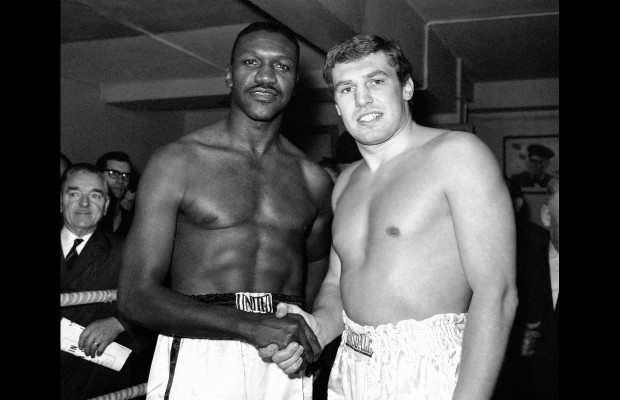
Powell, despite earning recognition as a developing heavyweight with world class potential, signed with the new American Football League in 1960. He was only briefly a member of the Los Angeles Chargers as they traded him to the Oakland Raiders prior to the start of the AFL’s inaugural season. As a Raider, Powell again was outstanding, especially as a pass rushing defensive end and remained with the team through their first two seasons, to again, spend more time on his boxing career.
Although Powell had originally
signed with the Los Angeles
Chargers when joining the AFL,
he was traded to the Raiders
before the league’s inaugural
1960 season began. At defensive
end wearing number 87, he
tormented his former team on
this play
Powell caught my father’s
attention in a big way when the
announcement was made that
Charlie Powell (“Charley” in the
fight game) would box the
rapidly rising former Olympic
Champion Cassius Clay. My father
took note, stating that “Powell
must be better than we thought
if he’s fighting the Clay kid.”
The Clay Kid of course later
became Muhammad Ali and on
January 24, 1963, he kayoed
Powell in the third round, two
fights prior to defeating Sonny
Liston. Powell later lost to
former World Champion Floyd
Patterson but it was widely
agreed that had he followed a
more traditional boxing path,
Charlie Powell could have been a
true contender and top rated
heavyweight for quite some time.
Comparing his $12,000.00 purse
for the Clay fight and noting
that it was more than his salary
for any of his NFL or AFL
seasons, Powell may have
realized that boxing could have
been a more lucrative path for
him. His brother Art Powell, a
top AFL receiver primarily with
the Titans and Raiders,
explained it best by noting that
if managers and trainers had
“handled him right, he might’ve
been a champion.” Charlie was
often rushed into fights with
very good opponents rather than
given the opportunity to work
his way up through the ranks as
most fighters were, especially
in that era. He was a serious
fighter but for long stretches
of professional football camp
and then the actual seasons, he
was not on the boxing scene.
The well-known boxing trainer
Cus D’Amato who trained Floyd
Patterson and mentored a young
Mike Tyson, briefly worked with
Charlie in Catskill, N.Y. and
said, “This is a kid with great
ability and a tremendous punch,
but with a lot of bad habits. If
only you’d brought him to me
five years ago.” When he finally
retired from both sports, he
became a salesman in the
automotive and cleaning supply
businesses and owned a business
in South-Central Los Angeles.
January 24, 1963, Charlie Powell
goes toe-to-toe with Cassius
Clay, but lost the fight on a
third round knockout
Unfortunately, and perhaps as a
result of football, boxing, or a
combination of both pursuits,
Charlie suffered from dementia
for a number of years prior to
his death. Brother Art said, “He
was losing his short-term
memory, but the long-term stuff,
he had that.” Much of the
“long-term stuff” included an
underrated and very good pro
football career and a boxing
career that saw him share the
ring with the higher rated
fighters of his era, including
Ali. A true all around athlete,
and obviously blessed with
favorable genetics as evidenced
by the career of brothers Art
and another younger brother
Jerry who played at Northridge
State and then as a receiver and
return man for the World
Football League Hawaiians in
1974, Charlie Powell was one of
the few who mined his talent and
rose to the top in two very
distinct athletic endeavors.
He was also proud of the fact
that as the oldest of nine
children, he had what he
believed was a wonderful life
and parental guidance. He at one
time stated “We weren’t rich,
but we had all the love and
attention in the world. There
were times when we had to pour
water instead of milk on our
Post Toasties, but there were
never any dope arrests in our
family and no one ever had a
child out of wedlock.” Men like
my father recognized great
athletic ability and “the right
type of upbringing” and it’s a
shame that more have not and
never did. Charlie Powell
deserved more.
